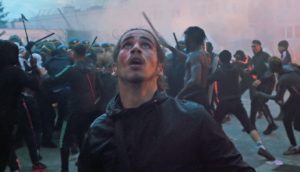GREEK/French director Costa-Gavras is best known for his third film, the political thriller Z.
Released in 1969, it won the Oscar for Best Foreign Language Film but, more importantly, brought a new visual style to cinema.
Gavras’ documentary realistic approach to shooting action sequences in a manner that imbued constant suspense influenced decades of film-makers from William Friedkin to Paul Greengrass.
Now Gavras can add his son Romain to the list.
The suspense thriller Athena is set in a large, working-class neighbourhood on a city’s outskirts.
It’s one of those stark, barely functional, mammoth concrete pours with residents all living in close-quarters.
The general economic malaise, disdain for politicians and distrust of authority sets the underlying social environment for the events that follow the murder of a young boy Idir.
Chaos erupts as protestors take to the streets and are driven back from the city centre by riot police.
A press conference is thrown into turmoil as a Molotov cocktail is thrown and a large group of male youths ransack the police station.
The offenders are traced to Athena where many other residents have formed barricades from behind which they mount attacks on police intent on finding the offenders and taking back control of the streets.
These sequences are impressively staged by Gavras and cinematographer Matias Boucard with long tracking shots that take the audience into and through the mayhem.
A masterful opening starts in the police station before joining several youths in a stolen police van all the way into their Athena stronghold.
The story focuses on three male characters – Idris’s older brothers Karim, Moktar, and Abdel – one a leader of the main protest group, one a decorated soldier torn between his duty and anger and the other a drug dealer.
It may not have the political heft of his father’s celebrated achievement, but Athena is a thrilling portent of things that will hopefully come.
